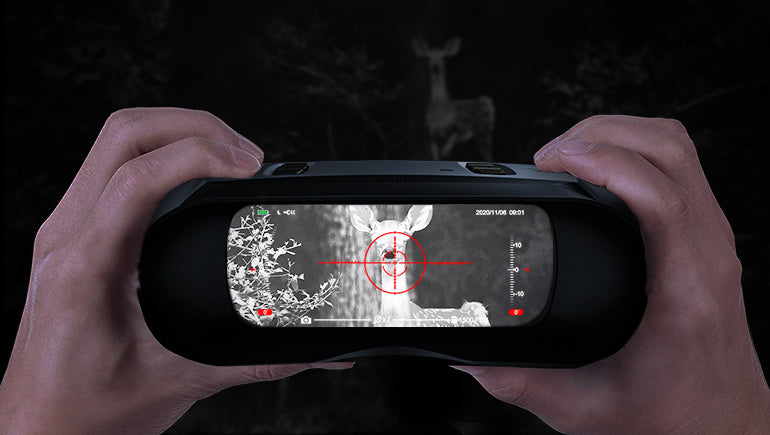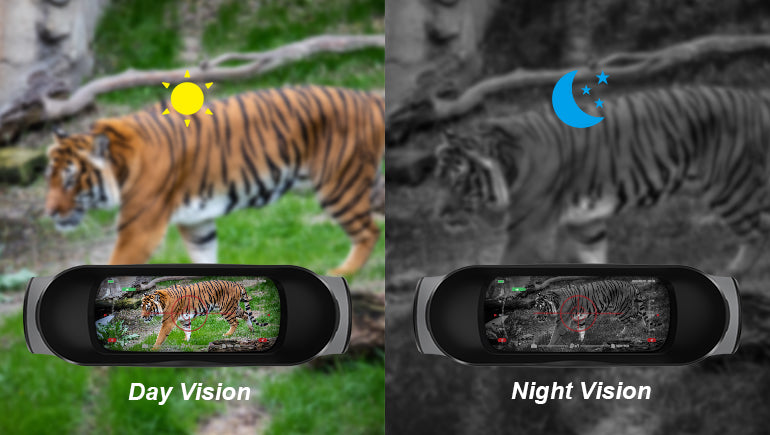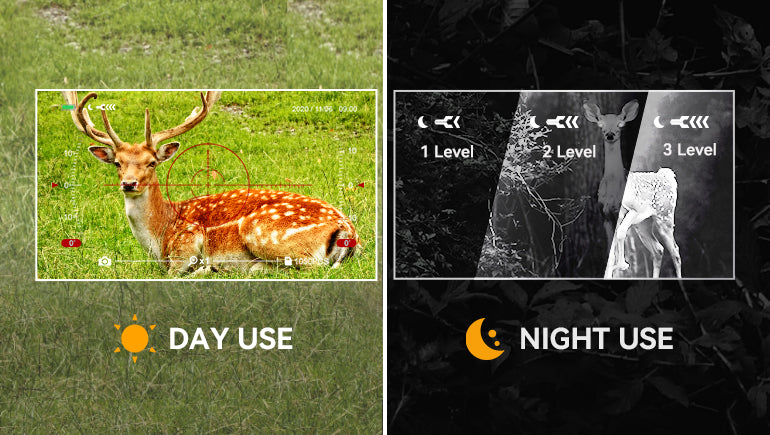When it comes to hunting, tools go a long way, especially when it comes to sight and surveillance using day and night vision binoculars. Our human sight has its limits after all, and good optics go a long way to help you locate and track all kinds of animals.
And when night falls your choice of binoculars matters even more. Nightfall can make it hard to see anything and can turn even a well-known area into a dangerous one so you need your essential hunting gear when you go night hunting or hiking.
So, if you are planning to go on some night hunting trips you'll be needing night-vision infrared binoculars.

Why do you need a day and night vision binocular?
If you ever go hunting or sightseeing at night then day and night vision binoculars are a no-brainer. After all, you'll always need a pair of binoculars to spot targets or take in the scenery. Night Vision Rangefinders , especially rangefinder binoculars, are a great choice when you’re exploring the outdoors at night.
No matter how good your sight is there are human limits to just how far our sight reaches. And if you are taking a pair of binoculars with you on your trips you might as well make the most of them and get a model that has you covered in both daylight and nightfall.
Types of low-light binoculars
When people discuss the different types of low-light binoculars they usually refer to which generation of development they come from. There are three main generations of low-light binoculars in the current market, and to this day you can find all three of them being sold, so learning the differences can be of help.
First Generation binoculars were developed in the 60s and use magnifier tubes for their operation, as such they are rather heavy and bulky. The 2nd Generation models instead rely on a micro-channel plate (MCP) electron multiplier that allows these binoculars to get a larger image without relying on a series of tubes. As of right now, the newest models come from the 3rd Generation, and they use an ion barrier on top of the MCP and added gallium arsenide into the manufacturing to improve the night vision capabilities of the binoculars.
Optical Design
All binoculars use a set of glasses and prisms to magnify an image, however, not all binoculars use the same prisms. Manufacturers mainly rely on 2 different types of prisms for binoculars, so you should understand what each style of prism offers.
Porro prism models offer more distance between the lenses resulting in better 3D images while remaining simple to manufacture and as such more affordable, They are however heavier and larger than the alternative.
Roof prism binoculars are narrower and tighter which means they are far easier to carry around without sacrificing image quality. These qualities however do mean that they tend to be pricier.
Smartphone Utility
While a few years ago it might have been hard to believe, many binoculars nowadays offer smartphone compatibility so you can do even more with your gadgets. Traditionally, this comes in the form of adaptors that allow you to seamlessly use your phone camera to take pictures and even record a magnified picture, which means anything you see you can now share with your friends and family.
READ MORE: Night Vision Monocular vs. Binocular: Which Is Better in Hunting?
What are the best day and night vision binoculars?
When it comes down to it the best possible binoculars are simply the ones that fit your own needs the most. There are many factors to consider when purchasing a pair of binoculars and chances are that what you value in a model might be a con for another buyer.
Of course, some factors always apply: You'll want a sturdy model, a solid warranty, and high-quality materials. But instead of trying to provide a nebulous definition of what makes the best night vision infrared binoculars, we should take a closer look at what factors you need to keep in mind when choosing a model for yourself.
Factors to consider in day and night vision binoculars
As we mentioned before many factors are relevant when buying a pair of binoculars, so we want to sum them up. All of these factors will play a role in how well your binoculars work, so take a close look at each category and keep them in mind when making a purchase.
1. Specifications
The first thing you'll need to ask yourself is how far you'll need to see. After all, the whole point of binoculars is magnification, so this is essentially the main question that you need to answer. For hunting in particular 10x42 is an amazing spec, but this is of course affected by how far you are shooting.
2. Protection
Your binoculars will be exposed to the elements as you use them, and this means that going for a model that offers integrated protection is a good idea. Waterproofing and fog proofing will keep your lenses clear in any condition, while shock resistance might be of help to make your binoculars last longer in general.
3. Field of Vision
Magnification is only one of the factors that apply to the image you visualize on binoculars. Do your binoculars offer a wide or narrow field of vision? Which one do you personally need? A wider field can help you better track targets, but it can also result in a bulkier device.
4. Eyecups
Eyecups provide comfort and make sure that your eyes are at the right distance from the lenses to use the binoculars as intended. However, if you wear glasses or share your binoculars you should look into adjustable eyecups.
5. Light Transmission Technology
This answers the question of how your binoculars improve your night vision. Some models are capable of naturally amplifying light, but higher-end binoculars can use infrared or thermal vision instead.
6. Ease of Use
Binoculars should be easy to pick up and use, if they need a lot of prep time to take a simple look you'll be at a disadvantage. And similarly, if they don't have a case or straps just grabbing them on time will be a challenge.
7. Durability
With any purchase you make you'll want it to last as long as possible. So make sure to check the ratings on a binocular as well as its materials so you can make sure you are buying a product that'll last.
Mileseey Day and Night Vision Binoculars

If you are looking for high-quality night-vision binoculars you shouldn't look any further than the Mileseey BNV21. Packed with a CMOS sensor that reacts to your light conditions in real time the BNV21 can provide clear and crisp digital images on both day and night lighting and ensure you get a clear picture no matter the hour.
The large LCD screen makes sure you get a clear and wide image, while the up to 8x zoom makes sure you can see as far as you need to cover any environment. Of course, as a digital device the features go beyond simple magnification, and the BNV21 not only has 3 unique settings based on your current needs but it also has recording and photographing options, so you can share any exciting moments or views with your friends and family
Frequently Asked Questions (FAQs)
We've already covered the main factors to consider when buying night vision binoculars and shared a great model that can make sure you are ready for any situation. But to be completely thorough let's answer some questions that will help you completely get rid of any lingering doubts that you might have.
How far can night vision binoculars see?
Different models will of course have different ranges, but the average distance is around 250 to 300 yards.
What is the difference between night vision binoculars and night vision goggles?
Goggles generally don't have any magnifications, as they are simply meant to let you watch better under night conditions and aren't binoculars. Additionally, the way you use them is different as well, since goggles use a strap to remain on your head at all times.
Can you use night vision binoculars during the day?
It depends. Some models are specifically meant only for the night and in these cases, the image just won't come right during the day. However dual-use binoculars like the NBV20 can adapt in real-time and this means they operate flawlessly in either condition.
Can I use my night vision device in the daylight?
If it's a dual model with the proper software, yes. This is why you should make sure to buy binoculars that state they are both for night and day.
Wrapping It Up
If you are going hunting you'll need a good pair of binoculars, this is a fact. And if you are already getting binoculars you might as well get a day and night dual model so you can make the most out of it and be covered regardless of the time or the lighting conditions. Of course, you need to consider various factors before knowing which model is just right for you, but here at Mileseey, we’ve got you covered.
At Mileseey, we didn't just want to enter the binocular industry, we decided to overturn it. We fully believed that digital magnification and measuring devices could be better, more advanced, and more affordable, and we made that the core belief that fuels all of our products and designs.
So if you want to learn more about binoculars and other hunting equipment, or just want to learn about upcoming deals before anybody else, make sure to subscribe to our newsletter and we'll remain in touch.
Related blogs from Mileseey
How to Choose Your Best Digital Night Vision?
How to Choose an Infrared Night Vision Monocular for Camping?
5 Main Factors That Affect the Accuracy of Laser Rangefinder Binoculars
Be the first to know the latest updates, tips, how-tos, exclusive deals, and discounts from Mileseey. Sign up for our newsletter today!

